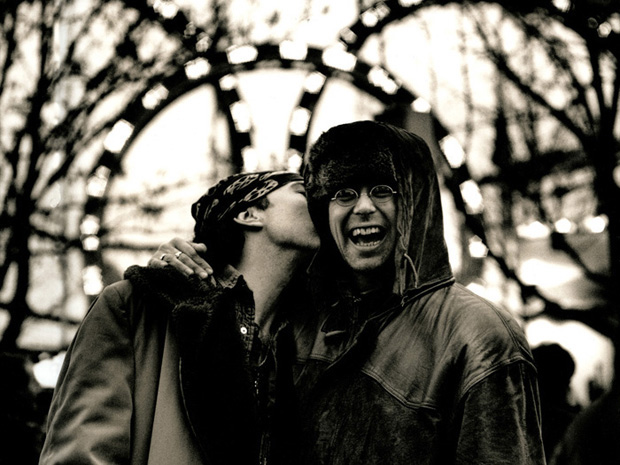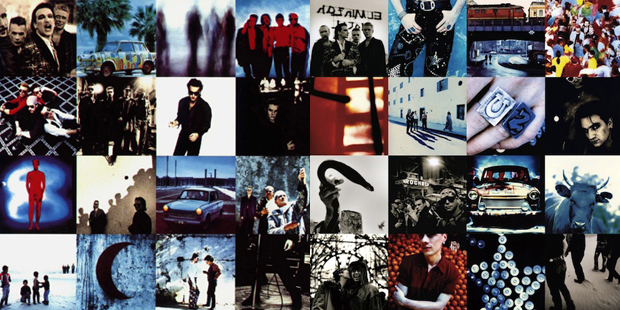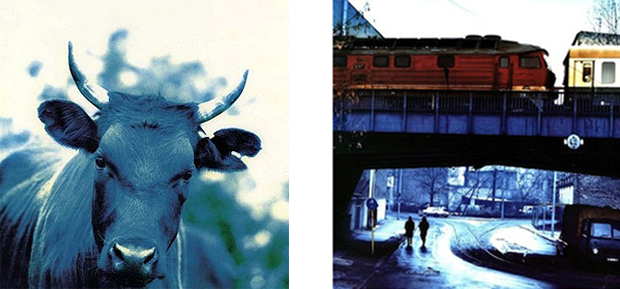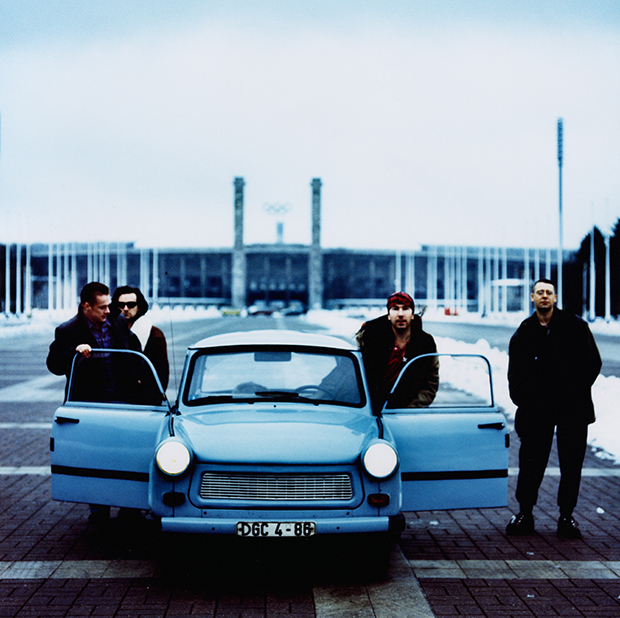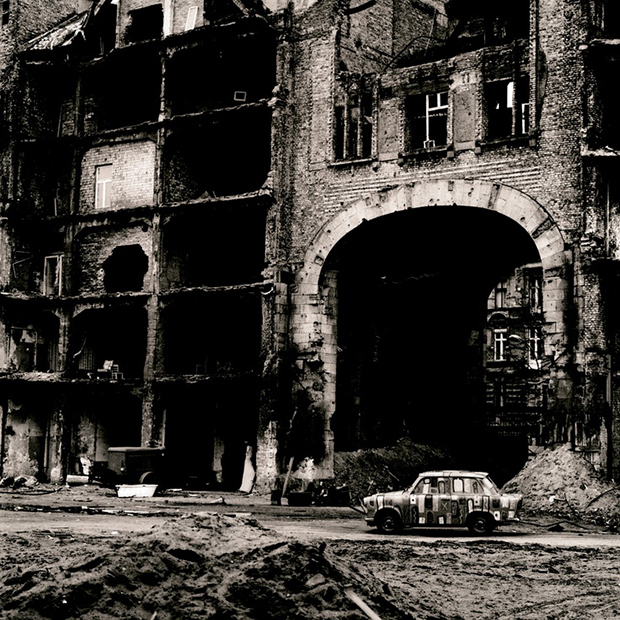
|
|
|
I seem to be the kind of person who defines their life by when certain records or films were released, and so yet another reissue is reminding me that exactly twenty years have passed without my noticing it. The Joshua Tree is probably the most influential album in my lifetime, but Achtung Baby is my favourite U2 record. When I started obsessing over music in the pre-Internet days of the late Eighties I didn't really appreciate just how great a time it was for music. This was a time when there were three weekly music papers in Britain and it was incredibly easy for me to discover bands like Sonic Youth, Dinosaur Jr., Mudhoney, Nirvana, Pixies, The Stone Roses, Spacemen 3, and a million others just as I was leaving school. Looking back at that list now, it's easy to see what a heady time it was for music and probably the last time that rock music was actually authentic and original (not to say that originality is important in any art form). In 1993 I spent six months in Berlin with my first band, picking up shows wherever and whenever we could. We lived in the abandoned Potsdamer Platz, just around the corner from Hansa Studios, which was left a veritable no man's land after the fall of the wall. Our home was a backstage trailer abandoned after Roger Waters' The Wall concert and our hosts were the absurdly named Mutoid Waste Company. It was a crazy time in Berlin, being able to set up camp in what was, and is once again, the thriving heart of the city. Just by chance U2 had a show on the Zoo TV tour at the Olympic Stadium two days after our arrival in the city and of course I crept away on my own to indulge myself as is my wont. It was an eerie feeling listening to songs about the reunification of Europe in a stadium that the Nazis had built and where the Hitler Youth had beaten their drums 57 years previously... the Swastikas cut into the architecture now clumsily filled in with plaster. I spent a great deal of my time in Berlin walking around the Tiergarten, with the sound of U-Bahn trains rumbling in the distance, contemplating the scale and importance of music and Achtung Baby was a huge part of my reverie. It was exciting to hear songs from the new Zooropa album being played on the American Forces Network (AFN) radio station while in Berlin. A few weeks after we left Berlin, U2 visited our Potsdamer Platz home with filmmaker Wim Wenders to shoot the video for the appropriately titled "Stay (Faraway So Close)", which is something that I'll always regret and daydream about. The early-Nineties was a fascinating time for music, with the messy demise of Baggy in Britain and the global dominance of Grunge from America. The self-indulgence of Rattle and Hum had left U2 seemingly pious, out of touch, and not to be taken at all seriously. With the commercial success of The Joshua Tree U2 became regarded as the musical establishment to be avoided at all costs. As a result, U2 were forced outside of all that was regarded as cutting-edge; they became almost the Warhol of the Nineties, neither part of the underground or the manufactured overground, but standing on the outside, looking in, and perfectly reflecting the moment. In the words of Brenden Kennelly: "The best way to serve the age is to betray it." Elements of the Manchester scene and rave culture brought about a new interest and sensibility in rhythm. A lot of sonic experimentation had taken place in the early Nineties, quite probably due to the advent of compact discs in the late Eighties. The amount of information that can be stored on a CD meant that musicians didn't have to worry about sound limitations and record needles leaping from the turntable. Is it a coincidence that the early Nineties produced quiet/loud bands like the Pixies and Nirvana? I'm sure Martin Hannett would have argued that technology changes music rather than vice-versa and there's certainly a case for that. As a result, some of U2's previous recorded works had sounded weak in comparison to their contemporaries. There are a lot of sonic experiments on Achtung Baby, often used to give the listener the feeling that their hi-fi system is broken, and it's definitely exciting to listen to for that reason alone. Brian Eno posed the question, "Are you really making a record that's recorded in a garage, or are you making a record that reminds you of the feeling of records that are made in garages (the way a film-maker might use a handheld camera to give the impression of documentary urgency)? Does it make a difference if people hearing this record say 'that sounds like trash', rather than, 'they've deliberately chosen to make a record that sounds like trash'?" To me, that's a fascinating argument. My theory is, if you spend time in a recording studio making something sound the best that you can, then it's no more pretentious to make something sound as bad as you can. Despite the surface matter of the record, the reason the album still holds true is that the songs are as compelling as anything U2 ever wrote. U2 have always been regarded as leaders rather than followers, in my mind, and for the first time Achtung Baby sees them being influenced by a contemporary music scene that had left them behind somewhat. U2 flew in the face of fashion throughout the Eighties, being anti-image and anti-masturbation, which is something that I always liked about them. The music on this record seemed to indicate some burgeoning interest in overtly sexual images and a preoccupation with sexual themes, the earnestness of The Joshua Tree now seemingly being chopped down. It's an interesting reinvention, and perhaps you could call it growing up, but I'm not sure. U2, the band originally least likely to say "baby" in one of their songs, now used the word in the title of their new record. But it hides what is probably the band's heaviest work. Personally, I like both sides of the band and feel it would've been inappropriate at this point for the self-righteousness and militant attitude of the previous decade to continue. The band took the last British Airways flight into the old German Democratic Republic, and into initial sessions at Hansa Studios in Berlin, where Bowie and Eno had recorded Low and Heroes. There, the band were pushed to breaking point in an attempt to find direction and a sense of self. Bill Flanagan described a split in the band between the "hats and the haircuts" as the hats wanting to embrace the more experimental nature of music and the haircuts wanting to stay true to a typical U2 sound. To paraphrase Bono from "Acrobat": "What are we gonna do now it's all been said? No new ideas in the house and every book has been read." Because of the pain of going though such re-evaluation, Achtung Baby is without question U2's most original and vital record. It's vital because the themes it tackles are the most personal that U2 ever got. Heavily influenced by the break-up of The Edge's marriage, there's a melancholy and hurt that hangs over this record like a dark cloud. The earnestness of previous albums is now lost in a personal monologue of betrayal that strips U2 bare. It's adult themes are hardly the subject matter of stadium rock. After U2's infatuation with America, it seemed time to turn their attention home to where a new Europe was slowly being built. The fall of the Berlin wall and reunification in 1989 brought with it a sense of hopefulness, and despite the darkness of the songs on Achtung Baby you feel a sense of freedom under it's surface. "Zoo Station", a song inadvertently inspired by the story of a WW-II British bomb hitting close by the Berlin Zoo and freeing the animals onto an astonished public, seems perfectly fitting of its time and place and to a renewed sense of playfulness. The influence of Berlin as a metaphor for this record is obvious not only in its mood but also in its place in time: the Berlin of the Thirties (decadent, sexual, and dark) resonating against the Berlin of the Nineties (reborn, chaotic, and optimistic). As with The Joshua Tree there seems to be a backbone of songs that form some sort of musical Heart of Darkness. "Until the End of the World", "Who's Gonna Ride Your Wild Horses", "Ultraviolet (Light My Way)", "Acrobat" (the first thirty seconds of which is as good, in my opinion, as anything U2 ever recorded), and "Love Is Blindness" all discuss the tension between love, sexuality, spirituality, faith, and betrayal. The influence of Scott Walker and Jacques Brel on these songs is easy to hear. "Until the End of the World" is an imagined conversation between Jesus and Judas in the Garden of Gethsemane. Not standard rock fare! However, Achtung Baby is the record where U2 discovered, or uncovered, their sense of humor and there is a knowing post-modernness in the lyrics' self-deprecation. "One" is probably the centrepiece of the album: a song about the break-up of a relationship and also about reunification, and the one song that most people will remember the record for. Larry Mullen's languid shuffle dominates most of the record, never better illustrated than on "So Cruel", and pushes the music forward with a sense of reawakening. Adam Clayton's reverberating bass is the perfect anchor; for the first time U2 has a rhythm section to be reckoned with. I'm excited about the re-issue of this album and to have all the outtakes together in one beautifully packaged set. However, the From The Sky Down documentary, with the band revisiting Hansa Studios and playing half-arsed versions of forgotten songs, is, quite frankly, embarrassing. I think it's fair to say that U2 have never since reached the heights of Achtung Baby. It's always some sort of event when U2 release a new album but not since this have they been anywhere near as compelling.
|
|

